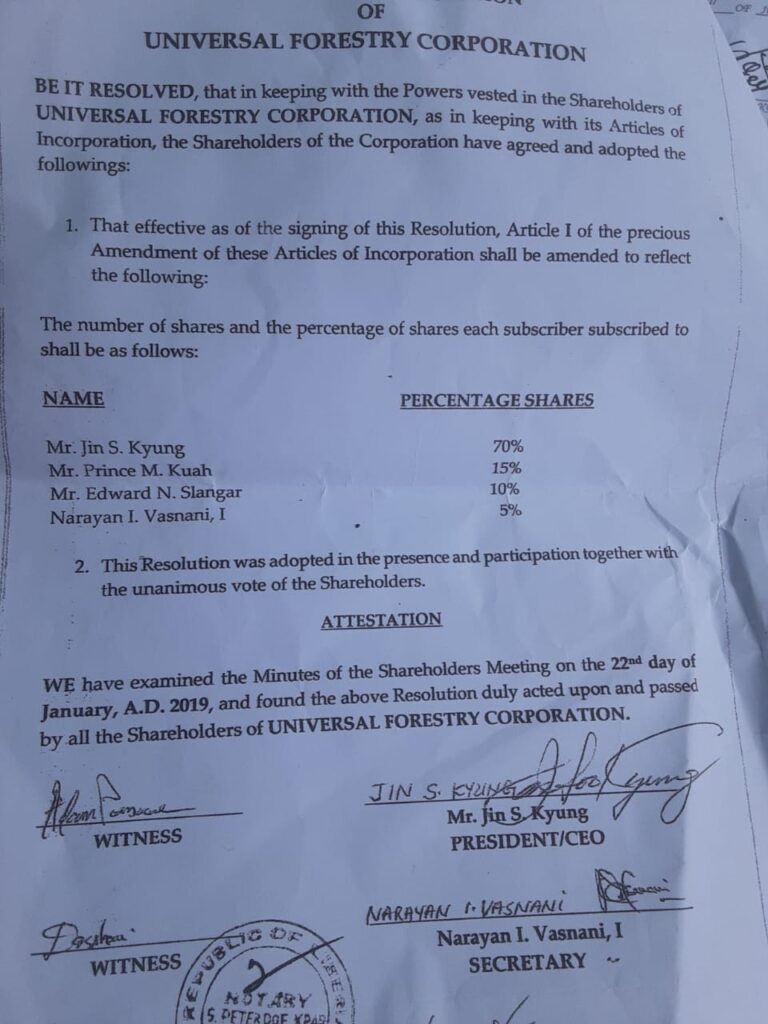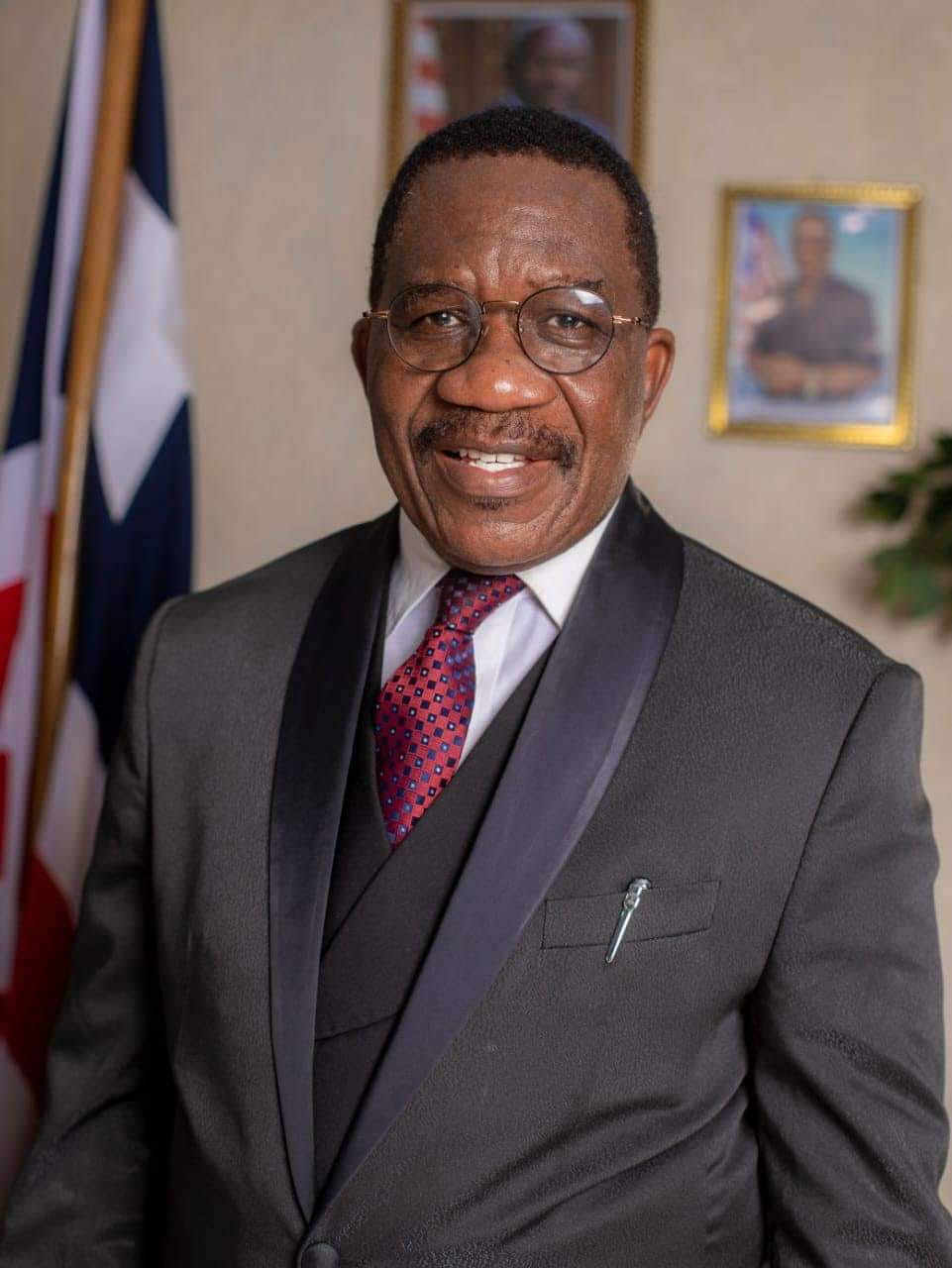Top: Minister of Posts and Telecommunications Cooper Kruah “relinquish” his stakes in Universal Forestry Corporation (UFC) to his son Prince Kruah. Picture Credit: Facebook/Emmanuel Fred
By James Harding Giahyue
MONROVIA – Minister of Posts and Telecommunications Cooper Kruah has admitted being in a conflict of interest with his continued involvement with a company currently mining and logging in Liberia. He faces dismissal, fines, and imprisonment.
The Postmaster General established Universal Forestry Corporation (UFC) on September 9, 1986, with an initial 25 percent shares. That was reduced to five percent when the company amended its article of incorporation in 2007 and remains that way, The DayLight investigation found. However, Kruah claims there was an amendment to UFC’s article of incorporation in 2019, even though we confirmed the status of the document at the Liberian Business Registry less than 24 hours before our initial publication.
Kruah had denied us an interview on the matter when we contacted him in November last year. “Publish anything you want to,” the Minister said after we denied his request not to have the conversation off the record.
“Debunking” our findings, Kruah said he turned his shares over to his son in July 2019, unlawfully increasing the family’s equity in the company to 15 percent.
“I want to use this medium to set the record straight that there has been an amended article of incorporation to the Universal Forestry Corporation and I relinquished my share to my son [Prince Kruah]…,” Minister Kruah said in a statement on Sunday. “This amendment of the Article of Incorporation is the best evidence for the public.”
Prince Kruah has 15 percent of the company’s shares, according to a legal document Minister Kruah presented, seen by The DayLight. The rest are held by Edward Slangar, former advisor to the late President Samuel Doe (10 percent), Jin Kyung, a foreign national (70 percent) and Narayan Vasnani, another foreign national (5 percent).
While The DayLight is investigating Kruah’s claim, he is still in violation of the laws governing the two industries as well as the Liberian Constitution and the Code of Conduct for Public Officials, provisions of the statutes show.
Minister Kruah’s claim to have turned over his equity in UFC to his own son is still a violation of the Minerals and Mining Law of 2000. The law mandates officials of government to “dispose of such mineral right or place such mineral right in a blind trust.” A blind trust takes care of private investment interests without the interference of the owner.
Minister Kruah has benefited from UFC, at least up to the time he claimed to have surrendered his shares to his son. UFC has had 11 mining licenses since his appointment in February 2018, records of the Ministry of Mines and Energy show.
Of the nearly one dozen UFC mining licenses, 10 are for semi-industrial-scale gold mining, prospecting, and dealer licenses, and the other is a diamond broker license. Four of these permits are still active. The company operates mines and dealerships in Montserrado, Grand Bassa and Nimba.
The company produced 16.85 kilograms of gold, valued at US$313,525 in the 2018-2019 fiscal year, according to the Liberia Extractive Industries Transparency Initiative (LEITI). It was one of the biggest contributors to the mining sector that year. From that period to last year, it paid the government US$99,545, according to the Liberia Revenue Authority (LRA).
Under the mining law, Kruah faces a US$2,000 fine, a 24-month prison term, or both penalties if convicted of the offense.
The DayLight has reached out to the Ministry of Mines and Energy on the matter. We will update this report once it makes a statement on the Kruah’s illegal involvement in UFC.
‘Influence and control’
UFC has an agreement with Sehzueplay Community Forest in Nimba County, which was signed on January 30, 2020.
Kruah so-called relinquishment of his shares to his son also breaks the National Forestry Reform Law. That law compels an official of government to transfer ownership of the “entity outside the person’s influence and control, such as an unrelated individual or a blind trust…”
In fact, the Forestry Development Authority (FDA) approval of that deal breaches the Ten Core Regulations, the detailed rulebook of the logging industry. Regulation 103-07 in particular disqualifies companies whose shareholders are relatives of members of the government for logging licenses.

The Managing Director of the FDA Mike Doryen told The DayLight in a mobile phone interview that the agency was investigating the matter. “Rest assured, we will take the appropriate action,” Doryen said. “I will not protect any official of government who breaks the law.”
Conflict of interest carries a fine between US$10,000 and up to three times the sum Kruah has received from his equity in UFC, or a prison term of up to 12 months, according to the forestry law.
It is not the first time that the Kruah-associated UFC has violated forestry legal frameworks. It was involved in the notorious Private Use Permit (PUP) Scandal, in which an estimated 2.5 million hectares of forests—or 23 percent of the country’s landmass—was illegally awarded to logging companies. A government-backed inquest found the company broke the law in different instances while logging in Geetroh, Butaw District of Sinoe County between 2010 and 2012. That investigation found that UFC did not have an environmental permit or a certificate to harvest trees and that it paid community benefits into a personal account. UFC’s PUP and 62 others were canceled and a moratorium remains in place on the permit.
The Kruahs’ stakes in UFC are also a breach of the Code of Conduct, which defines conflict of interest as “when a public official, contrary to official obligations and duties to act for the benefit of the public, exploits a relationship for personal benefit.” Under this law, he faces a fine, suspension and dismissal, among other penalties.
The Code of Conduct has its roots in the Liberian Constitution, which says, “No person, whether elected or appointed to any public office, shall engage in any other activity, which shall be against public policy, or constitute [a] conflict of interest.”
The DayLight is running a three-part series on UFC that also focuses on the company’s other illegalities and failure to pay communities’ benefits.




